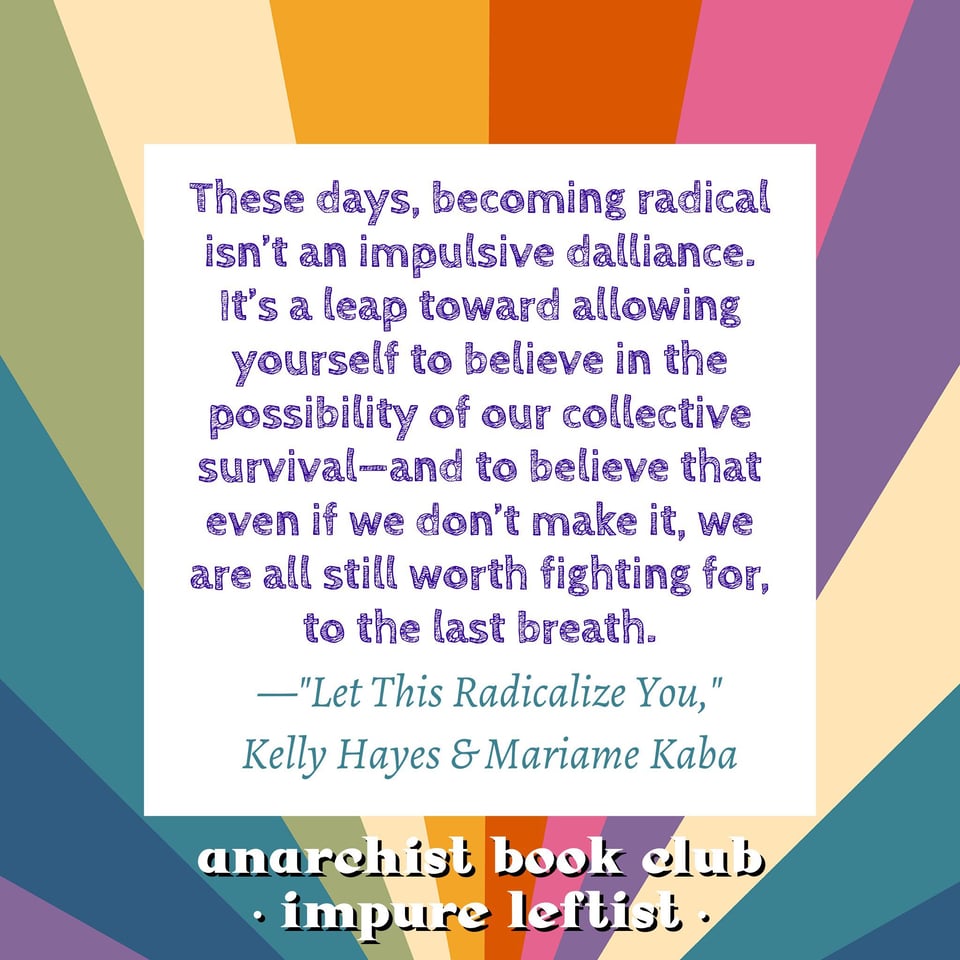What's the role of despair in change work?

I got gut-wrenching news yesterday, and my body has been alternating between grief and terror all night and day. There have been more than a few moments of all-consuming despair.
This is a feeling we're all familiar with, and we all learn to manage it in our own ways. In a world where people often use terrifying news to try and motivate us into action, we've all experienced the full-body freeze when it all feels like too much and we don't feel capable of doing anything, let alone fix the planet-sized problems pouring out from our screens.
The title of this month's book club pick comes from co-author Mariame Kaba's quote, "Let this radicalize you, rather than lead you to despair." The first few chapters frequently reference how despair is used by capitalist systems to demoralize and desensitize us, keeping us focused on our own tiny spheres instead of our roles in larger networks of community and interdependence:
“The powerful are… relying on our cynicism, our divisions, and our despair, in addition to their mass apparatus of repression, to prevent us from cultivating a new way of living in relation to each other. To defy and defeat them, we must cultivate hope, belonging, care, and action.”
Let This Radicalize You repeatedly emphasizes the importance of generating hope and creativity as antidotes to despair, both to draw people into our movements and to sustain us in difficult times.
So... does despair do any good in the world?
In and of itself, not really. Yet it illuminates how deeply we care about each other, and our collective futures. Despair sinks in most fully when we feel that our internal locus of control is beyond our reach. Basically, when we feel like things are monumentally bad and we don’t have the power to make them better, we can feel so helpless that we want to give up.
And yet, despair is a gateway to vital experiences, if we allow ourselves to move through it and find what’s on the other side.
Despair is a gateway to collective grieving. It's not possible to be hopeful all the time. This kind of forced, false optimism can easily tip into toxic positivity. It's important to acknowledge the depth of the unknown, the pain of loss, and the immense fear we face. Most societies have developed rituals for collective grieving, but in modern times, most of us don't create enough space to come together and honor the anguish we’re experiencing.
Despair is a gateway to acceptance. On some level, we're aware that we can't fix everything. But humans don’t like uncertainty, and our brains push back to try and take charge as much as we can. Then, when reality laughs in our faces, we experience internal collapse and tell ourselves Well, I guess I can’t change anything. It’s this all-or-nothing framing that gets us into trouble. Despair can remind us how small we are in the vastness of time and space, but we can find anchors to hold onto that help us find acceptance. We can acknowledge that our spheres of influence may be small, but they matter, and our lives (and joy!) matter too.
Despair is a gateway to connection. When things seem most bleak, we may be forced to ask for help in ways we never expected. We connect more deeply to our intuition when it seems like the only part of ourselves that we can hold onto. If you spent much time on TikTok in 2020, you saw that the collective experience of quarantine allowed people to find humor and kinship in our rapidly deteriorating mental health. We may be scared and struggling, but at least we’re not alone. Sometimes it’s the only thing that gets us to open up.
It’s okay if the 24/7 awfulness parade leads you to despair, and not toward radical activism. Just remember that you don’t have to stay there. You can pause and ask what this despair has to teach you, and see what you glimpse on the other side of it. We find enormous strength when we allow this gateway to invite us deeper into our lives and our purpose.
As for my nasty news: I had a hearing yesterday for temporary orders in my custody case, in which I’m trying with all my might to protect our child from their abusive father. The hearing didn’t go well, and the court is ordering immediate unsupervised time that will ramp up to a 50/50 parenting schedule. This is devastating, and I’m allowing myself to feel the devastation. But it is not the end of the road—and I am lucky to have an incredible team to help me navigate the next steps, and support my toddler through what unfolds next. You can join my support team by donating, subscribing to the paid version of this newsletter ($7/mo or $70/yr), or forwarding this email to a friend or five.
Don’t let the despair keep you down.
We’ve got this.
Much love,
Nat